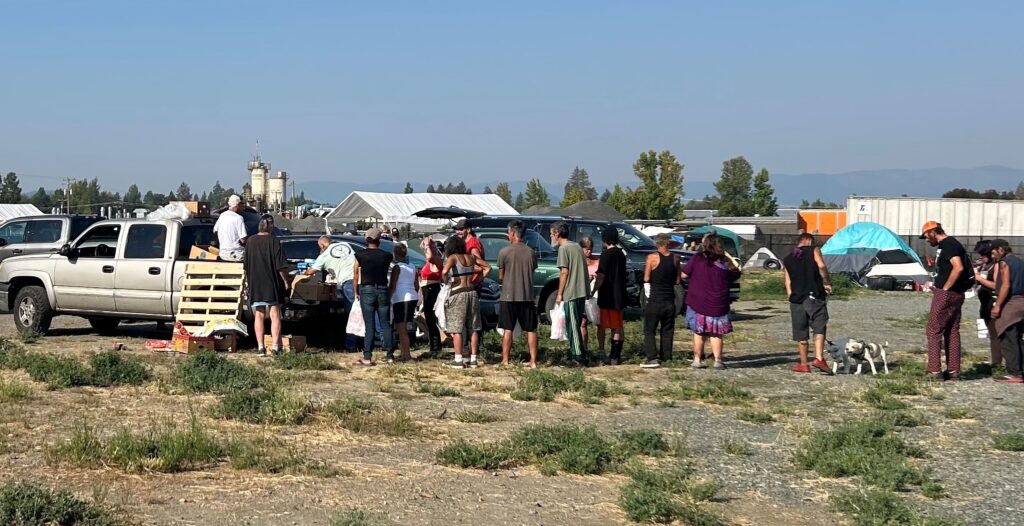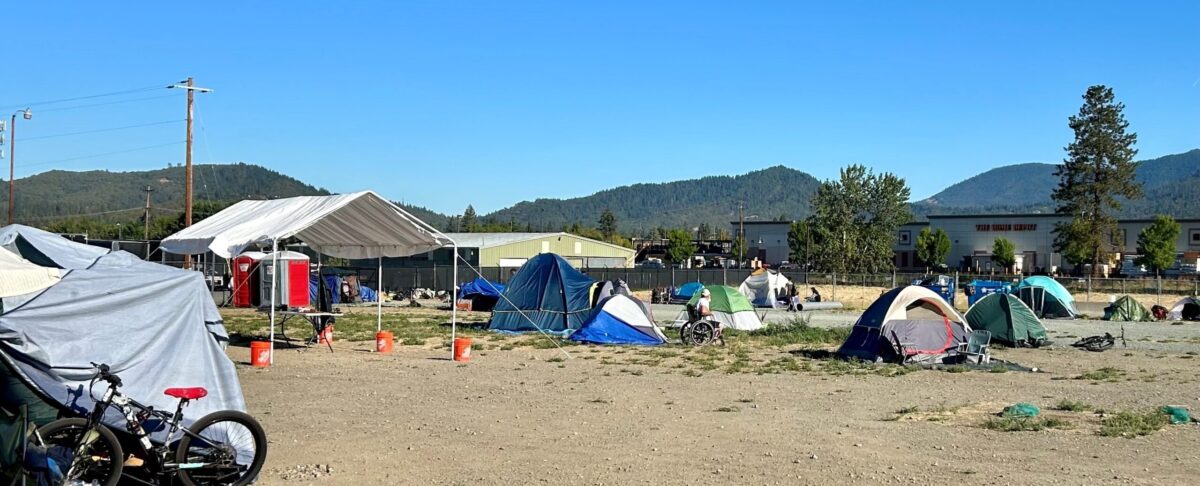Chad Patty is recovering.
His past four weeks included a trip to the emergency room and what he considers a near-death experience in Grants Pass, Oregon’s new camps for unsheltered people. But now Patty’s in a medical respite room at Rogue Retreat, which provides temporary shelter and long-term housing to people experiencing homelessness in nearby Medford.
Patty, who is diabetic, has other health conditions and gets around with help from a cane or wheelchair, is ready to put his time at the campsites behind him.
“The conditions out there,” he said, “were so ridiculous for people who are like me—disabled, sick. … It’s like they were trying to kill us. It really is.”
Grants Pass opened the camps in late August, two months after the city won a Supreme Court case that has inspired a wave of local camping bans around the country.
Soon after the city opened its camps, Grants Pass councilors increased how long people can stay at the camps to seven days. But that doesn’t change that people staying at either of the city’s two campsites must move once a week between the campgrounds.

Since last month, the Mobile Integrative Navigation Team (MINT), which provides medical care to unsheltered residents in Grants Pass, and a disability rights attorney have told city staff and councilors that the requirement to move disproportionately affects people with disabilities, some of whom have received citations because they can’t move to the other campsite on their own.
The attorney, Disability Rights Oregon’s Deputy Legal Director Tom Stenson, said in a letter to city staff that the policy leaves Grants Pass vulnerable to a lawsuit under the Americans with Disabilities Act (ADA), which prohibits discrimination based on a person’s disability.
The recipients of the letter, Interim City Attorney Mark Bartholomew and Chief Warren Hensman, didn’t return interview requests. Streetlight left several messages for Aaron Cubic, city manager for Grants Pass, but missed a callback and was unable to connect with him.
Asked if she has concerns that requiring people to move from camp to camp could open Grants Pass up to an ADA lawsuit, Mayor Sara Bristol said: “I don’t know about the legal situation. I am worried about the people because I know that some of them are elderly or disabled, and it’s hard for them to move without assistance. The really important thing for me right now is that the situation is just temporary, and we’re still adjusting to what our long-term plan is going to be.”
Why Patty won’t go back to Grants Pass’ campsites
Last year, Patty had been homeless off and on for the past 17 years when his mother asked him to visit her in Grants Pass during the summer.
“I kind of got stuck down there living in the parks, and at first, it wasn’t so bad,” Patty said.
But after one summer passed into the next, Patty’s health worsened. He started having trouble walking, relying on a cane and wheelchair to get around. He went to the emergency room twice during the summer this year—once for strep throat and another time for severe diarrhea.
That second hospitalization in late August happened just as Grants Pass was transitioning to an updated camping ban that made it illegal for unsheltered residents to camp on city land with the exception of its two approved campsites.
Shortly after Patty left the hospital and arrived at Westholm Park, officers told unsheltered residents they had to move to the city’s campsites.
Patty was still sick, dealing with brutal diarrhea, stomach pain and exhaustion. MINT helped him move to the campsite on 755 SE J St., a dirt-and-gravel lot in an industrial neighborhood that at the time had no water, no shade and was baking in the summer heat.
“I couldn’t make it to the porta-potties because they were too far from the tent, and I just toughed it out that day,” Patty said.
The next day, he felt worse but was relieved to see friendly faces from MINT. As the nonprofit continued its rounds, Patty grew weaker and fell asleep in the sun.
“I couldn’t really talk or move, and I couldn’t even see the screen on my cellphone,” he said.
Patty credits MINT with saving his life. Charles Utley, a volunteer for MINT, found Patty, and the nonprofit put him in a Motel 6 for two days as he recovered from his illness and extreme dehydration.
Now recuperating at Rogue Retreat, Patty feels better than he ever did in the parks, and he hopes to take advantage of housing opportunities the nonprofit has.
“That way, I don’t have to go back out to the streets,“ he said.
But would he ever go back to the campsites in Grants Pass?
“I will look at any other opportunity but going back to the camps,” he said. “The rules and regulations they put on us, some people could do it because they’re able-bodied. I’m disabled. I can’t do it.”
Things slip through the cracks in a rushed plan
Bristol, several council members, advocates for unsheltered people, residents and other observers have said the campsite plan was rushed and not fully thought through.
“The council, in general,” Bristol told Streetlight in late August, “is stumbling into this without a real thoughtful plan.”
She said several years ago, the council made efforts to start a campground that would have been staffed and provide basic resources, like water, but it “fizzled out” as parts of the project fell through.
Bristol said in August: “I wish we had come at (the campsites) from the plan of creating a space that has some ground rules, 24/7 management staff on site, some navigation services for people, and where we have thought-out (details), whether it’s shade, water and things like that, for an outdoor space or indoor accommodations.”
Some advocates have wondered if problems baked into the plan are intentional and meant to pressure unsheltered residents to leave the city.
“Sometimes I don’t feel like our goals are in line because I feel like you guys want to make them uncomfortable,” MINT Executive Director Cassy Leach said during a presentation to the city council in late August. “Why are we moving them?”
She added: “There’s not a service provider out there who will tell you that it helps people. There’s not a police officer that I know who works out there and does citations who wants to do that or see them move on a regular basis. Maybe they understand the why, but no one’s winning, and it’s costing a lot of money and resources to have them move.”
MINT has been helping people move from one camp to the next, but Dr. Bruce Murray, chief medical officer for MINT, said: “These people have no reason to move. Sure, we’ll help them move 10 feet. We cannot help this many people move a mile.”
[ Read more: Grants Pass plans to build city-funded campsites without knowing how much they’ll cost ]
Before the city updated its camping ban last month, unsheltered people camping in parks were required to move every few days, but they had more options then. Now they must move between camps that are about a mile apart.
The J Street campsite, where about 100 people stay on average, is about two and a half acres. The other campground on 704 NW Sixth St. is only half an acre and usually has about 15 people staying there.
“Logistically, it doesn’t make sense,” Leach said during an interview last week. “They’re all supposed to move, and where are the 100 people at the (J Street) site supposed to go once (the smaller) one’s filled up? It just doesn’t seem very thought out, and the plan is set up to fail the way it is right now.”
A new requirement that tents be at least six feet apart also limits how many people can stay on the lot.
Bristol told Streetlight last month that the city had previously required people camping in parks to move every few days as a way to reduce trash.
“It’s probably helped keep some members of the homeless community from accumulating way too much stuff,” she said.
Grants Pass hasn’t taken action since learning the city is at risk of an ADA lawsuit
Two weeks ago, people who had stayed beyond the allowed number of days started receiving citations and trespass charges. So Murray began writing doctor’s letters for medically fragile people and people with disabilities to give to police.
The letters say that the person “is medically fragile with complex health problems and should not move to an alternate campsite. The likelihood of serious injury due to their limited mobility, intolerance of temperature extremes and physical, and possibly behavioral health issues is too great to warrant the risk.”
[ Read more: Homelessness is affecting more older adults as rents eclipse fixed incomes ]
Murray said by last Friday he’d provided about 25 letters to medically fragile people and people with disabilities.
Murray said Grants Pass officers, who patrol the camps several times a day, have continued to issue citations and trespass charges to people with the letters.
Bristol said the city allows officers to decide whether or not to cite someone who has a credible doctor’s letter.
On Sept. 13, Stenson sent a letter to Bartholomew and Hensman asking the city to stop requiring people with disabilities to move from one camp to the other. Stenson’s letter said the city’s vulnerable to a lawsuit under the ADA if it doesn’t consider reasonable accommodations, like allowing people with disabilities to stay at one camp.
“The disabilities of these individuals vary,” he wrote. “One person has only one leg; another uses a wheelchair; still others have serious cardiac and respiratory conditions that reduce their stamina or make it dangerous to move long distances.”
The ADA requires cities to provide people with disabilities with reasonable accommodations, meaning a change or exception to a rule, practice or service.
“You have to let them use supports,” Stenson said, describing accommodations. “You may have to give them more time than other people. That’s pretty common, and it’s easy to understand that somebody who uses a wheelchair or who has a serious hernia would not be able to carry all their belongings to the next campsite, especially not doing it every week.”
[ Read more: Climate change threatens 41% of rental homes, report says ]
Stenson said he spoke to Bartholomew last Thursday, and, “The response was essentially, ‘We’re thinking about what we’re going to do. We don’t have anything to share with you and we don’t really want to talk to you further,’ so we’re still digesting that and figuring out what the next steps are.”
A water tank arrived at Grants Pass’ main campsite, but the city isn’t paying for it
Since unveiling the city’s campsite plans in early August, Cubic has advocated against the city providing water to campsite residents. He’s argued water’s an “amenity” Grants Pass would have to provide indefinitely if it ever starts.
During a city council meeting in late August, Cubic said the nonprofit United Community Action Network (UCAN) had tentatively offered to pay for water at the J Street site.
But UCAN, which didn’t respond to an interview request, didn’t follow through, telling MINT it didn’t have funding for the water.
Instead, MINT has provided the bulk of the water supplied to people staying at the campsite.

Murray said when he went to the J Street site three weeks ago: “I saw people in 100-degree heat with no water. We had an instantaneous phone tree that went out to people, and we had six people there with 100 gallons of water, and that got us through that day. Since then, it’s been: Who’s going to deliver water today?”
For now, people staying at the J Street campsite have access to a reliable water source. Last week, MINT began renting a 125-gallon water tank for the campground.
Leach said the new tank costs $50 per day to maintain.
[ Read more: Evictions and domestic violence cases topped legal aid programs’ caseloads last year ]
Bristol said water was one of the details that weren’t considered with the campsite plan.
“It all kind of comes back to that central question of whose responsibility is it to help people when they’re not able to meet their basic needs,” Bristol said.
When asked whose responsibility she thinks it is to provide water, she said: “I would like there to be water at these sites. Personally, I would do the whole thing differently if I got to choose.”
Leach remains concerned about the most vulnerable people MINT serves.
“It’s just sad,” Leach said. “It’s really sad that humans can treat other humans this way.”
Editor’s note: This story was updated to correct that MINT provided people at the J Street site with 100 gallons of water, not hundreds, in one day three weeks ago.
Contact Streetlight editor Mollie Bryant at 405-990-0988 or bryant@streetlightnews.org. Follow her reporting by joining our newsletter.
Streetlight, previously BigIfTrue.org, is a nonprofit news site based in Oklahoma City. Our mission is to report stories that envision a more equitable world and energize our readers to improve their communities. Donate to support our work here.



